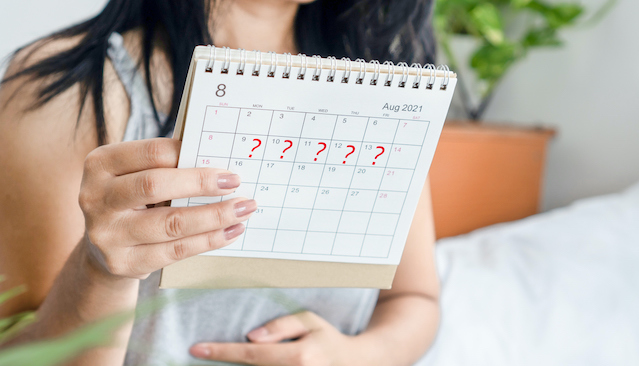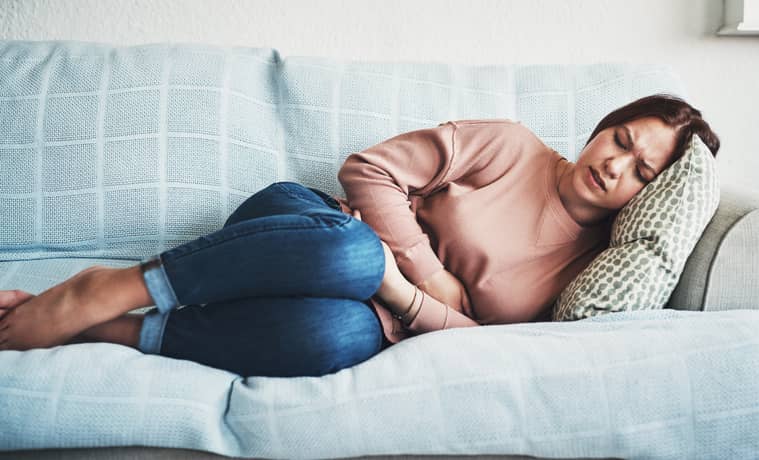Overview
Are you wondering why your menstrual cycle doesn’t follow a regular pattern? If the length of time between your periods changes by more than a few days every month, or you sometimes miss periods altogether, this guide is for you.
Irregular or infrequent periods are often short-lived and nothing serious, and lots of women will get them at some point. And the question ‘why is my period irregular’ can have many different answers. For example, irregular periods can be triggered by stress, weight loss, exercise, birth control (contraception) or medical conditions.
They can also happen at certain times in your life, such as after pregnancy or at the start of the menopause. They’re common when you first get your period in puberty, too. But whatever life stage you’re at, if you’re not sure why your bleeding pattern has changed, it’s best to make an appointment to see your doctor.
Read on to find out about possible reasons why your periods don’t come very often or have started coming early or late, and what you can do about it.
What are irregular periods?
An average menstrual cycle lasts 28 days – but many women don’t have a cycle that follows this pattern. In fact, it’s considered normal and regular if your cycle lasts anywhere between 21 and 35 days. It might sometimes vary by a few days from month to month, too.
If your periods fall outside this range, however, they’re considered irregular. The gaps between your periods might be longer or shorter, or you may miss periods altogether.
It can be helpful to keep a diary of your cycle length – counting from day 1 of your period to the day before your next period starts – so you can see if there are any big changes from month to month, or if they’re particularly long or short.
Types of irregular or infrequent periods are sometimes referred to as:
- oligomenorrhea – this means you have irregular and infrequent periods, which are more than 35 days apart
- polymenorrhea– this means you have frequent periods, which are less than 21 days apart. Having frequent bleeding episodes could also mean that some of the bleeding isn’t your normal period, known as ‘intermenstrual bleeding’
- amenorrhea – this means you have no periods. It can be ‘primary’, when you don’t start having periods by the age of 15 or 16, or ‘secondary’, when your periods stop for more than 3 months and you’re not pregnant, breastfeeding or going through the menopause. Read more about absent periods
What causes irregular periods?
There are many possible causes of irregular periods. Sometimes they can change without a clear reason, and your cycle can also go back to normal on its own. There can be lots of factors involved, including your lifestage, lifestyle, health conditions and medication.
The main causes of irregular periods are:
- puberty – when you first get your periods, they can take some time to settle into a regular pattern
- the start of menopause – in the lead-up to the menopause, known as the perimenopause, your periods may become more or less frequent, as well as lighter or heavier. Read more about perimenopause periods
- contraception – many types of contraception can cause irregular or less frequent bleeding, or even stop your periods completely, including the progesterone-only pill and the intrauterine system (IUS). With some types of contraception, it can take up to 3 months for your cycle to return to normal once you stop using them
- breastfeeding – it’s common to have no periods or infrequent periods when you’re breastfeeding. They may only come back once you stop or your baby isn’t drinking as much milk
- pregnancy – missing a period is an early sign that you may be expecting a baby. If you’ve missed a period and it’s possible that you could be pregnant, you can do a test at home (read about how to use a pregnancy test)
- stress – this can affect your hormones and can make your periods longer, shorter or even stop them
- extreme weight changes – losing or gaining a lot of weight, eating disorders and excessive exercise can all cause period changes and make them irregular
- medical conditions – several conditions can make your periods irregular or infrequent, including polycystic ovary syndrome (PCOS) and other problems with your ovaries or womb (uterus), thyroid problems (hypothyroidism or hyperthyroidism) and diabetes

When to see a doctor
If your cycle has become irregular or you have infrequent periods, it’s best to see a doctor to discuss it further, so you can get support in finding the cause and best way to deal with it.
You should see a doctor about irregular periods if:
- your periods suddenly become irregular and you’re under 45
- your periods are less than 21 days apart or more than 35 days apart
- there’s a big difference between your shortest and longest cycles (at least 20 days)
- your periods last longer than 7 days
- you haven’t had a period for 3 months
- you’re getting periods less than every 3 to 4 months and you’re not using any contraception
- you’ve been trying to get pregnant for at least 1 year (or 6 months if you’re over 35)
There are also some other period changes or problems that suggest you may need further investigations and/or treatment. You should see a doctor if you have:
- painful periods – known as dysmenorrhea
- heavy periods – known as menorrhagia
- bleeding between periods or after sex
- bleeding after the menopause – see a doctor as soon as possible
If you’re worried about any symptoms, you can try our Smart Symptom Checker. It can give you information about the possible reasons for your symptoms and help you work out if you need to see a doctor.
How are irregular periods diagnosed?
Your doctor will ask you questions about your symptoms, medical history, general health and lifestyle. They may also examine you and check your height and weight. In some cases, they may refer you for further tests or to a specialist.
How to help your doctor help you
It’s a good idea to keep a note of any changes to your cycle. Your doctor may want to know about:
- what your period changes are and how long they’ve been happening
- how they’re affecting you
- how often you usually get your period and how long your usual cycle is
- how old you were when your periods first started
- any family history of period problems
- any lifestyle factors that may be relevant – such as changes to your weight, exercise routine or stress levels
- any medication you’re taking, including contraception – and anything you’ve recently stopped taking
- any other symptoms – such as symptoms of PCOS, menopause or perimenopause or thyroid problems
Tests your doctor may recommend
Depending on your age and symptoms, you may offered the following tests:
- smear test (cervical screening test)
- pregnancy test
- sexual health screen to check for sexually transmitted infections (STIs)
- blood tests
- pelvic ultrasound scan
What treatment can you get for irregular periods?
You won’t always need treatment for irregular periods. In some cases, there won’t be an obvious reason your periods have changed, and your cycle may settle down on its own.
Any treatment you’re recommended will depend on what’s causing your irregular periods, but may include:
- lifestyle changes – if your period changes are related to your weight, exercise routine or stress levels, you may be advised on how to make some changes. Read about eating a balanced diet, how to lose weight safely or gain weight safely, and tips for stress relief
- contraceptive pills or IUS (coil) – these are often recommended to help regulate periods or reduce bleeding problems, depending on the cause. On the other hand, if your unpredictable periods are a side effect of a contraceptive you’re taking, your doctor may recommend you try a different method
- treatment for other conditions – if another condition is causing irregular periods, you’ll be offered the appropriate treatment. In some cases, you may be referred to a specialist in female reproductive health (gynaecologist) or hormone conditions (endocrinologist). Read about how to manage irregular periods in the perimenopause, PCOS treatment or treating underactive thyroid

Your health questions answered
What should I do if I miss a period?
Answered by: Healthily's medical teamMissing 1 period doesn’t always mean you’re pregnant, but you can take a pregnancy test to put your mind at rest. Missing a period can be down to lots of things, and some issues might resolve themselves over your next few cycles. You should see a doctor if you miss 3 or more periods in a row, so they can check for underlying health conditions.
Can I still get pregnant with irregular periods?
Answered by: Healthily's medical teamIrregular periods don’t alway mean you’ll have problems having children, or that it will take you longer to get pregnant. But it will depend on the cause. Irregular periods in PCOS may mean you don’t release an egg (ovulate) every month – so having sex every 2 to 3 days throughout your cycle can help improve your chances, rather than relying on the small window in your ovulation calculator. You can also work on improving your fertility (and that of your partner) by having a healthy lifestyle, maintaining a healthy weight, cutting out alcohol and not smoking. Read more about getting pregnant.







